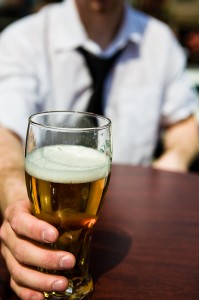
Study: Fighting in Families Before and After Father’s Alcohol Treatment
I’m a person with substance use disorder in recovery. I speak freely about it and without shame. I’m not the man I was before treatment. I am the self I was always meant to be. A huge part of my change was due to my kids. What happens when an alcoholic parent gets treatment? In this parenting season, in the days between Mother’s Day and Father’s Day, a new study published in the journal Addictive Behaviors looked at family conflict before and after a father’s treatment for alcohol addiction. And it shows there is hope.
First the bad news that you already know: alcohol addiction may start at the point of contact between a drinker’s lips and the bottle, but then it spreads through your body and brain and beyond to your relationship and family. It’s no surprise that marriages that include an alcoholic have higher rates of divorce. And a parent’s struggles with alcohol have far-reaching effects on children, including cognitive, behavioral and emotional problems that can carry forward into adulthood. Much of this is due to the conflict between people that alcohol dependence creates.
That’s before. The study showed that with treatment, the outlook changes.
The study followed 67 families that included an alcoholic father entering treatment, his sober relationship partner, and at least one child aged 4-18. As dad walked in the door of a treatment facility, a questionnaire showed that kids in these relationships had been suffering – they experienced far more conflict than kids in families that didn’t include an alcoholic parent. Basically, children of alcoholics had watched their parents fight.
Fast forward: the fathers went through treatment and returned to the families. Six months later, kids in these families saw no more fighting than kids in non-alcoholic families. Treatment had erased the conflict gap.
That’s great news, but here’s the interesting part: in this study 20 fathers stayed sober and 43 relapsed within the year (and 4 quit the study). Can you guess what fighting in these families was like a full year after the father’s treatment, with and without relapse?
Surprisingly, the study’s authors write that, “Improvement following treatment appeared to be present for the entire treatment sample, rather than limited only to treatment responders who achieve full-scale remission.” Even in families whose fathers relapsed, conflict stayed low at the one-year mark. It was as if the process of treatment had a stabilizing effect on the family even if the father relapsed.
Now, it would be interesting to see results at the 2-year or 3-year mark. But at least for a year, the process of treatment helped families stop fighting. I hope in this parenting season, you’ll join me in looking forward to a future free of alcohol-fueled fights, in which you and your partner experience no more conflict than anyone else.
THE BEST CALL YOU WILL EVER MAKE
Call now to speak confidentially with an admission counselor.